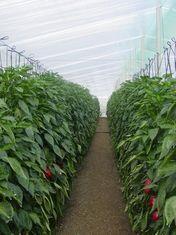

The Spanish region of Almeria is to overhaul its crop management in the aftermath of its recent pesticide crisis.
The area will introduce integrated pest management on a massive scale for the 2007/08 season.
More than half the peppers exported from Spain are grown in Almeria and the region, which hosts some 8,000ha of pepper production, is one of the most important players in the European pepper market.
But the discovery of an unauthorised pesticide, methyl-isofenphos, on Almerian peppers by German authorities in mid-November last year led to the closure of more than 10 firms and temporarily halted exports.
Nick Green, UK procurement manager at Florette, told FPJ: “The Spaniards need to get themselves in order. They have really shot themselves in the foot with this one.”
Green, pictured, said Florette has now pulled out of Spain.
He added: “The processors should vote with their feet because we can buy peppers and tomatoes elsewhere, and the Spanish producers need to listen to us.”
Around seven per cent of pepper production areas in the region were controlled by integrated pest management in 2006. This is set to jump to 70 per cent for the 2007/08 season.
David Romera Archilla, commercial director at Almeria-based Agroponiente, told FPJ: “The situation is difficult at the moment. Almeria really needs to review its system, but there are similar issues in other countries, not just in Almeria.”
Agroponiente produces some 210,000t of fresh produce each year and is one of the three largest fresh produce companies in the south of Spain.
The firm will adopt integrated pest management in more than 100ha of greenhouses for the 2007/08 season - 80 per cent of its total pepper production - up from 18ha in 2006, said Romera Archilla.
He added: “This has been a successful project and we want to go further. There is no better system than integrated pest management, and this is how we are planning to draw suppliers back to Almeria.”
Agroponiente has also started up a new company - Natural Produce API - an association for integrated products, in time for the next season.
Romera Archilla insisted: “We are trying to do a good job here, but of course there are some real issues about the use of certain pesticides which must be addressed.
“Being such a big company, with more than 900 employees, makes us very conscious of the problem, and we have a specialist technical team of 10 engineers.”
Almerian producers are calling for a hard line to be taken against those few producers who endanger the future of production in the region, Romera Archilla added.



